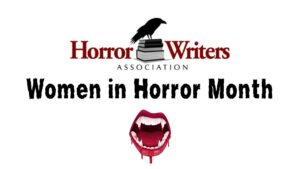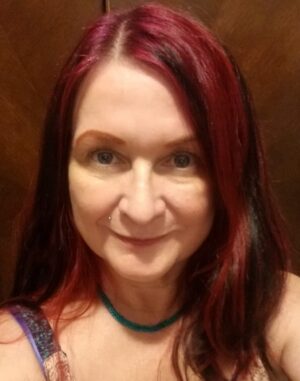
What inspired you to start writing?
An abusive family life, fairy tales, and a need to ponder the universe. That, and my older brother left behind a large collection of SF books when he moved out. My angsty poems weren’t always about me but about infinity, the cosmos, life, and death. My first story, besides the one called “Gargantua Wolfgang” (which is naïve and truly horrendous), might have given some indication on the path I was headed for. It was the start of a novel along the theme of “The Most Dangerous Game” by Richard Connell. Ray Bradbury, The Twilight Zone, and a host of creepy Vincent Price horror films that my mother took us to (in a drive-in no less) when my parents fought, had me steeped early on in the fantastic.
What was it about the horror genre that drew you to it?
I’m not alone in saying that the horror we write sometimes allows an outlet and takes away from the real horrors that so many people endure in different ways. Although, with my early stories I didn’t think I was writing horror. I was writing SF and fantasy, but editors kept rejecting my work because they “don’t do horror.” So, I guess I fell into it. Maybe the dark seed that rests in my soul just lets its tendrils spread a bit farther. I still look at my works and think, oh this one isn’t horror, and then someone thinks it is, so really, horror lies in the mind of the beholder. The more I learned about horror, the more it felt like the cradle in which I had always slept. I’m sure every generation and every century has had their horrors of the time, such as the Black Death, invading tribes, tsunamis, volcanic eruptions, voracious animals, teeming insects, cannibalistic appetites, radiation, war, etc. That fear and whether to stand and fight no matter how futile, or to lie down and accept the inevitable—that is something we all relate to, and in it, we either lose or find our humanity.
Do you make a conscious effort to include female characters and themes in your writing and if so, what do you want to portray?
Being female, in one sense makes it easier to write what female characters. While I do write some male points of view, most of my characters do default to female. My first full collection of poetry, I Dreamed a World, has each poem from the female perspective. Some would say I write a lot of feminist poetry, but I think of it as equalizing: giving women in those tales and myths their voice, their autonomy, and their freedom. My stories often consider women to already be free and not of a downtrodden history of subjugation. This world has so many cultures and countries where women and trans people are abused, owned, sold, and treated worse than a barnyard animal. Until that changes, until women don’t have to fear for their lives, or defend their rights and their bodies, or live up to other people’s expectations, or dress one way or another to stop the wrong types of attention, well then, I’m probably going to continue to write female characters in some form.
What has writing horror taught you about the world and yourself?
I’m sick and twisted but I can get along in polite society. In essence, most of us writing horror have acknowledged the shadow side. We see its dark figure perched on the fence of our subconscious and we know it’s there and capable of terrible things. I write those terrible things and in so doing, I can live in the world. I take the darkness the world spews back and I filter it into stories and poems, sometimes sprinkling in the more hideous flavors and sometimes seasoning with light and hope. The world has taught me that anything I write, while maybe not of reality in its speculations, is still not as horrific as what people do to people. It has shown me that those who deny that they have a shadow side are the ones more likely to shoot up a school or club or do other self-serving mayhem.
How have you seen the horror genre change over the years? And how do you think it will continue to evolve?
There are of course the ever-popular tropes, such as the haunted house, the creepy doll, the descent into madness, Lovecraft mythos, zombies, vampires, and other creatures that consume in one way or another. Vampires climbed in popularity as the forbidden seductor, the dark side of immortality. Then werewolves joined the club. Then zombies surged forward. Now we have strange fungal zombies and alien parasites. We have fewer BEMs and more thoughtful looks into people and how they live within the horror. While the trappings change, the tropes will remain and the “other” will continue to be what we fear. That inherent genetic worry of losing self, of being an individual, will never change. It is part of our humanness. At one time, heroes battled gods and other demi-immortals and sometimes became demi-gods. Now we battle zombies and fungus but invasion has always been part of the human condition. Having one’s rights, choices, and life is fundamental to being free (and I might add, has not always been seen as something women should have), so I don’t think the evolution of our fears will evolve away from this for millennia (should humanity live that long). How we tell the tales, and the voices that will speak up, that’s changing, and we will see very much less of the white man as a hero and more as an invasive species (not that other societies and cultures don’t have their invaders). We will see more of a global and multi-cultural voice, and I hope we see an evolution of women not considered as women first but as human beings on equal footing in every way.
How do you feel women have been represented thus far in the genre and what hopes do you have for representation in the genre going forward?
Jumping off from my previous comment, I think we are in a golden era. Women aren’t just the attack of the 50-foot woman, the vampiric seductress, or the victim being rescued by the brawny hero. Even Disney with their fairytale animations, which are definitely saturated in sugar-coated princesses has started to realize that not every woman needs a man, and not every struggle is about ruling. If Disney can change, then others can too. We see stories emerging where gender doesn’t matter. We see women in their own struggles and whether as monsters or saviours or some shadow area between the two, they are now running their own shows. They aren’t just ornaments and sacrifices and stand on their own. We’re not completely there yet, and we can go farther. Game of Thrones showed many women used as tools and as victims, who grew into power in different ways, but that all stemmed from a patriarchal world. While it is still important to tell these tales of oppression and show the horrors of such things, we can also build new stories that show worlds where there is no gender conflict, and where every gender is accepted as being a human equal to everyone else. But can we do it? It is too much human nature to other someone else, to find something to fight against, to raise oneself above, to feel important. If we ever treat all genders as normal, well what about age, or height, or race, or religion, or hairstyle, or tattoos?
Who are some of your favorite female characters in horror?
I’ve read so much and watched so many movies that they all swirl together and I cannot pull out any specifically at the moment. I might add that the same goes for male characters.
Who are some women who write horror you recommend our audience check out?
There are so very many and my list is far from exhaustive. I won’t mention the writers of the past as there are many ways to find the Shirley Jacksons and Mary Shelleys. This list includes poets and fiction writers: Nancy Kilpatrick, Sarah Read, Rena Mason, (okay, Angela Carter), Linda Addison, Katherine Quevedo, Carina Bissett, Stephanie Wytovich, Marge Simon, Angela Yuriko Smith, Jacqueline West, F.J. Bergmann, Crystal Siddell, Gemma Files, Gerri Leen, Christi Nogle, Octavia Cade, Lee Murray, Hailey Piper, Sara Tantlinger. There are so many that I know the moment I send this list, I’ll think of ten more.
What is one piece of advice you would give horror authors today?
Don’t be afraid to go too far. Be bold, be brave. You can always edit it back later.
And to the women who write horror out there who are just getting started, what advice would you give them?
Don’t let anyone make you believe you can’t write. It’s just their ego talking. Writing, like every other talent under the sun, takes practice. Read, watch, write, and repeat. Take the rejection, get back up, and do it all again.
 Colleen Anderson is an award-winning author, who has been nominated for the Pushcart Prize, the Aurora Award, the Rhysling, Dwarf Stars, and Elgin Awards. She has edited several anthologies and freelance edits. A Ladies of Horror Fiction, Canada Council, and BC Arts Council recipient, Colleen has served on Stoker and British Fantasy award juries, judged, and co-taught the Poet’s Journey for Crystal Lake Publishing. Her writing has been published in seven countries with works in Best Indie Speculative Fiction, Shadow Atlas, Cemetery Dance, OnSpec, and many more. Her collections, I Dreamed a World, The Lore of Inscrutable Dreams, A Body of Work, and Embers Amongst the Fallen are available online. She is the current president of the Science Fiction and Fantasy Poetry Association (SFPA). Find her on her website.
Colleen Anderson is an award-winning author, who has been nominated for the Pushcart Prize, the Aurora Award, the Rhysling, Dwarf Stars, and Elgin Awards. She has edited several anthologies and freelance edits. A Ladies of Horror Fiction, Canada Council, and BC Arts Council recipient, Colleen has served on Stoker and British Fantasy award juries, judged, and co-taught the Poet’s Journey for Crystal Lake Publishing. Her writing has been published in seven countries with works in Best Indie Speculative Fiction, Shadow Atlas, Cemetery Dance, OnSpec, and many more. Her collections, I Dreamed a World, The Lore of Inscrutable Dreams, A Body of Work, and Embers Amongst the Fallen are available online. She is the current president of the Science Fiction and Fantasy Poetry Association (SFPA). Find her on her website.


What an interesting interview, but then, Corrine is one of those women you never forget meeting in person and chatting. Her poetry is outstanding. I really liked that she says if Disney can change (from sugar coated stories to those where the heroes don’t have to bend to cliche) then so can we! “Not every woman needs a man, not every struggle is about ruling.”